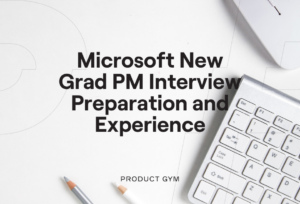A Product Manager interview, at its core, is a conversation that allows the interviewer to get to know you. There is so much to you than just a resume, a LinkedIn profile, or a few sentences to sum up your career. This is why you’ll likely be asked “tell me about yourself”, along with other behavioral and personal questions. How can you keep the job interview dialogue from becoming an interrogation instead? Here’s how to keep the conversation going and make the interview a success.
Interview Dialogue: Icebreaker Questions
The “tell me about yourself” question is a filler. It is something to say because it is a little awkward when two people first meet: this question serves as an icebreaker. It is the best icebreaker most Hiring Managers know of. When Hiring Managers ask the “tell me about yourself” question, we can all agree that the only information they want to know about you is what is relevant to them. So, how do you know what to tell them about yourself; when you do not know what they want to know about you? To keep the interview dialogue conversational, ask them first! Ask the interviewer why they scheduled a call with you in the first place. The interview is about getting to know each other, so get to know them and the company they represent.
The challenge for Hiring Managers is that there are no classes or training on how to actually hire people for specific roles. If you are interviewing with a company right now as a Product Manager, there are only one of two reasons:
- You are there to solve a problem they cannot solve.
- You are solving a problem they do not have the time to solve because if they did; they would have solved it already.
Use interview dialogue to find out what it is the company needs from you, and then show them how you can provide it.
Take the Initiative
Product Management is one of those jobs where you do not get told what to do. It’s like being your own business owner in that way. From day 1, you tell other people what to do. This is why you want to take initiative, starting with the job interview. Open up the interview dialogue by being the first person to fire off a question. Do not wait for them to ask you behavioral questions.
Ask the first question, “What is it about my background that stood out to you?”
Or, say this:
Hey! Thanks for making the time, I am really big fan of what you guys are doing right now. How is your day coming along so far? I am really curious about something: What is it about my background that stood to you guys? I am asking because I know you must sort a lot of resumes throughout the day and was wondering what caught your eye?
Follow Up
You want to follow up on these questions by digging. Understand that you are being considered for a role where you have to solve a major problem for them. It would be a problem that if this company could solve, they would have already. So it is up to you to uncover what that problem is.
The job description that you read is seldom the job that you’re interviewing for. The definition of your job differs greatly depending on the stakeholders you interview with. In addition, the job you are sold on doing is also different from the job you end up doing.
Which begs the question, “Why would they air out their dirty laundry in a job description posted for everyone (including their competitors) to see?” It does not make any sense. That’s why you have to dig and gather that information during the interview.
Interview Dialogue Examples
Hiring Manager: Oh, we are interested in your design background.
You: Aw thank you, why is that?
Hiring Manager: We are trying to solve ______ problem.
You: What have you guys done so far?
Hiring Manager: We have tried _________
You: How is that working out? What kind of challenges are you running into?
Hiring Manager: Our challenges are _________
You: How does all this make you feel?
Be the Expert
Throughout this process, you want to consult them on every angle and every turn. There is a lot that hiring teams do not know. You want to be the expert to educate them. Even if you do not have the best answer, go and explain how you will find the answer or what strategy you will formulate to put a plan together, and if you do not know the answer, let them know you will get back to them on it (and actually do it).
Call them out on it if it is something ridiculously outrageous or just too niche. We had a former member who just interviewed with a company that was asking the most industry-specific questions, and he responded that he did not know the answers to any of those questions. Their response? It does not seem like anybody we talk to knows either.
When all else fails, do what Mark Zuckerberg did:

Master Interview Dialogue
Please appreciate that hiring teams are trying to solve problems that they do not always know the best ways to solve, have any idea on how to solve, or are even certain what the real problems are. There is simply not enough time throughout the interview process.
Think about it: you apply, your resume is reviewed for 2 minutes (at best), you have a 25- to 35-minute phone call, that leads to a 3- to 5-hour meeting, and your competency for doing the job is determined. That just does not make sense. The process is flawed and if you expect to win against all the other competitors for this role — go the extra distance and take the initiative.

These calls are opportunities for you to understand if this is an organization you want to be a part of as well. If things are really bad, why would you want to join that company? This is why you need the interview to be a conversation, where you learn just as much as the interviewer does. Initial calls are a great time for you to learn more about the role.
Still Have Questions?
If you’re learning the ropes of product management, it helps to have some support. Product Gym is a lifetime membership program for PMs, PM job hunters, and product people of all sorts. Getting people jobs in product management is our bread and butter: that makes us very good at assessing where you’re at in your job hunt and equipping you with the knowledge and skills you need to kickstart your dream career in product management. And that includes necessary information like learning about Scrum and Agile Methodology.
If you want to learn more about the ins and outs of Product Manager skills and job search tactics, get in touch with us! We’re offering free career coaching sessions with our in-house team of PM Recruiter experts. We’d love to hear from you.



